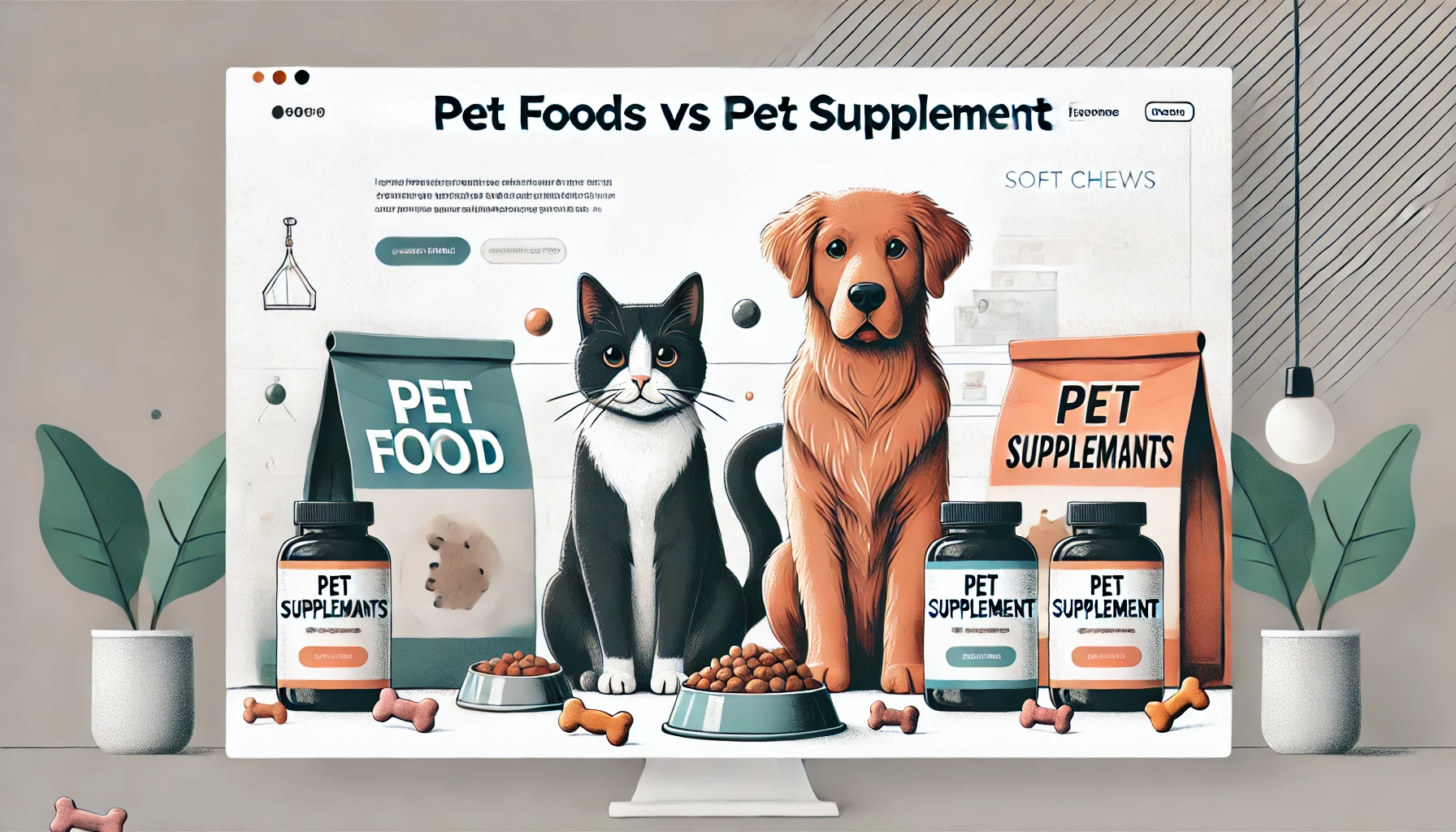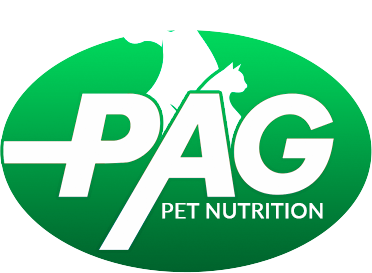
15 Jan Pet Food vs. Pet Supplements Do Cats and Dogs Need More Than a Balanced Diet
The Difference Between Pet Food and Pet Supplements: Do Cats and Dogs Need More Than Just a Balanced Diet?
Introduction
As pet owners become increasingly concerned about their pets’ health, questions arise about the role of nutrition in ensuring long-term wellness. With a wide variety of pet food and nutritional supplements on the market, it’s important to understand how these products differ and whether supplements are necessary. Can a balanced diet alone meet the needs of cats and dogs, or do they require additional support through supplements? In this article, we explore the differences between pet food and supplements, when supplements might be necessary, and how to make the best decisions for your pet’s health.
What is Pet Food and What is a Balanced Diet for Pets?
Pet food is specifically formulated to provide the essential nutrients required for a pet’s daily life. A balanced diet for pets includes a mix of proteins, fats, carbohydrates, vitamins, and minerals that support overall health and well-being.
A key difference in pet food is whether it is complete or complementary:
Complete pet food is designed to meet all the nutritional needs of pets, making it suitable for daily feeding without additional supplements. This type of food contains the right proportions of nutrients for a pet’s specific life stage, whether they are a puppy, kitten, adult, or senior.
Complementary pet food, on the other hand, lacks one or more essential nutrients and is meant to be fed alongside other foods or supplements to provide a balanced diet.
The importance of feeding species-specific food cannot be overstated. For example, cat foods are designed with a higher protein content and essential nutrients like taurine, which are critical for cats as obligate carnivores. Similarly, dog food is formulated with ingredients and nutrients that support a dog’s specific dietary needs.
In conclusion, a balanced diet forms the foundation of a pet’s health, helping with growth, energy, and vitality.

What Are Pet Supplements and How Do They Differ from Pet Food?
Pet supplements are products that contain additional nutrients or functional ingredients designed to target specific health conditions or deficiencies. They include vitamins, minerals, fatty acids, probiotics, and other active ingredients that provide additional benefits beyond regular pet food.
The main difference between pet food and supplements lies in their function:
Pet food provides all the nutrients necessary for daily feeding and is designed to meet a pet’s complete nutritional needs.
Supplements address specific issues such as joint health, immune support, digestion, skin, and coat conditions, or weight management.
For example, supplements containing glucosamine and chondroitin are often given to older dogs to reduce pain and support joint health, while probiotics may be used to improve digestion. Supplements can be particularly beneficial for pets with health conditions or those who need additional nutrients to support their lifestyle.
Are Nutritional Supplements Necessary for Dogs and Cats?
When it comes to deciding whether supplements are necessary, the key factor is whether your pet is receiving a complete diet. If your pet is fed a well-formulated commercial pet food labeled as “complete,” they are getting all the nutrients they need for their life stage, and supplements may not be necessary.
However, there are certain situations where nutritional supplements can provide additional benefits:
Breeds with specific needs: Long-haired breeds of dogs and cats may benefit from extra fatty acids, such as omega-3 and linoleic acid, to maintain healthy skin and a glossy coat.
Health conditions: Pets with joint problems, digestive issues, or chronic conditions like diabetes may benefit from targeted supplements, such as joint supplements or probiotics.
For most healthy pets, a balanced diet should meet all their nutritional requirements, but for those with specific health issues, supplements can play a beneficial role.
Cat Supplements: When Are They Necessary?
Do cats need supplements if they are already eating a balanced diet? In most cases, a complete cat food provides all the necessary nutrients. However, certain situations may require cat supplements to address specific health concerns.
Common examples of cat supplements include:
-
Taurine: This essential amino acid is crucial for heart health, vision, and reproduction in cats. Although it is usually found in complete cat foods, cats with specific health conditions may require additional taurine.
-
Probiotics: Helpful for cats with digestive issues, probiotics can help balance the gut microbiome and improve overall digestion.
-
Omega-3 fatty acids: These are important for maintaining a healthy coat and skin, particularly for cats with skin allergies or dry fur.
Cats have unique dietary needs, and providing them with food designed specifically for felines is crucial. However, in certain cases, supplements may be helpful, especially when recommended by a veterinarian.

Dog Supplements: When Should You Consider Adding Them?
Like cats, dogs generally receive all the nutrients they need from a well-balanced, complete dog food. However, certain situations may call for dog supplements to support specific aspects of health.
Common scenarios where dog supplements are useful include:
-
Joint health:As dogs grow older, they might face issues like joint stiffness or arthritis. Supplements with glucosamine, chondroitin, and omega-3 fatty acids can aid in reducing inflammation and enhancing their mobility.
-
Digestion support: Probiotics can aid in digestion for dogs with sensitive stomachs, helping to maintain gut health and prevent issues like diarrhea.
-
Skin and coat health: Dogs with long or thick fur may benefit from extra fatty acids to maintain the health of their skin and coat, preventing dryness and irritation.
While dog supplements can be beneficial, it is important to avoid over-supplementation. For example, giving too much calcium to puppies can interfere with their bone growth, leading to developmental issues.
Can a Balanced Diet Alone Meet All Pet Needs?
In most cases, a balanced diet provides all the necessary nutrients for a pet’s life stage. Whether you have a puppy, kitten, or senior pet, a well-formulated commercial pet food is designed to meet their nutritional needs without the risk of excesses or deficiencies.
That said, there are situations where supplements can enhance a pet’s diet:
-
Aging pets: Older pets may benefit from supplements to support joint health, cognitive function, and overall vitality.
-
Pets recovering from illness: Pets recovering from surgery or illness may require extra nutrients to regain strength and recover more quickly.
-
Pets under stress: Calming supplements containing L-tryptophan or beta carotene can help manage anxiety and stress.
Treats and Snacks vs. Supplements: What’s the Difference?
Pet treats and snacks are typically used for training, bonding, or simply rewarding pets. While some treats may offer additional health benefits, such as dental health, they are not designed to be a primary source of nutrition and should not exceed 10% of your pet’s daily caloric intake.
Supplements in treat form are designed with functional ingredients to address specific health concerns, such as joint support or dental care. These nutritional supplements are often made into palatable treats to encourage easy consumption. For example, joint chews for dogs may contain glucosamine or chondroitin, which are helpful for older dogs with mobility issues.

Key Considerations When Choosing Supplements for Pets
Before adding any supplements to your pet’s diet, it’s important to:
-
Check for clinical evidence: Ensure that there is scientific research supporting the benefits of the supplement.
-
Consult a veterinarian: Always seek advice from a vet or veterinary nutritionist before introducing supplements, especially if your pet has health issues or is on medication.
-
Avoid unnecessary supplementation: Giving your pet supplements without understanding their needs can lead to nutrient imbalances and health problems.
Conclusion: Do Pets Need More Than Just Pet Food?
For most pets, a complete and balanced diet provides all the essential nutrients needed to maintain health and vitality. Pet food should always be the foundation of your pet’s nutrition. However, in some cases, supplements can be beneficial, particularly for pets with specific health conditions or life stage needs. Always consult with your veterinarian before introducing supplements to ensure they are necessary and safe for your pet.

